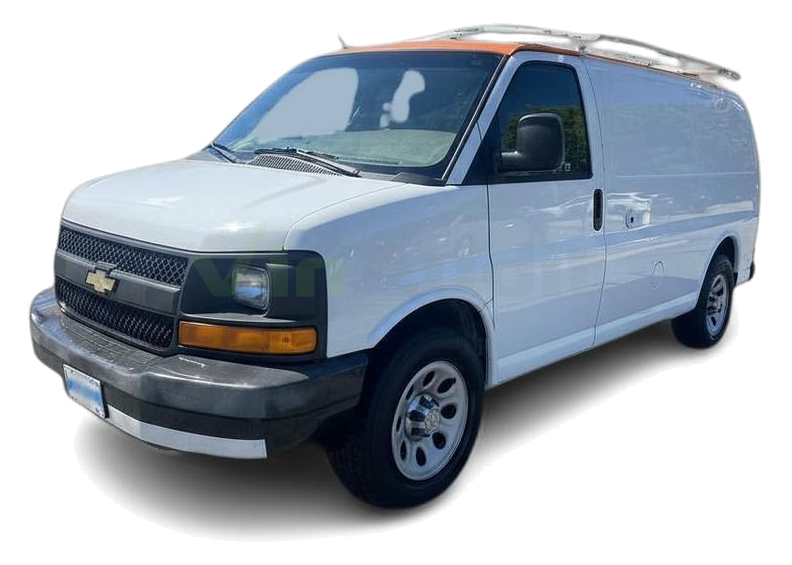The Good
The 2010 Chevrolet Express offers strong, reliable performance thanks to its potent V8 engines, providing ample power for heavy loads and towing. Its practical, spacious design maximizes cargo or passenger capacity, appealing to businesses for its utility and low operating cost. While not luxurious, its straightforward mechanics contribute to long-term reliability and excellent value, making it a workhorse that delivers consistent service.
The Bad
Known weaknesses for the 2010 Chevrolet Express include its somewhat dated interior design and limited modern tech features. Fuel economy, especially with the larger V8s, is a significant drawback. Owners might also report ride harshness when unloaded, and potential for rust on older models. Watch out for transmission issues and electrical glitches.
2010 Chevrolet Express: Quick Overview
- Engine Options:
- 4.3L V6 (available on 1500 series): Standard in some cargo models.
- 4.8L V8: Standard on 2500, available on 1500.
- 5.3L V8: Available on 1500 and 2500 series.
- 6.0L V8: Standard on 3500 series, available on 2500.
- Horsepower:
- 4.3L V6: Approx. 195 hp
- 4.8L V8: Approx. 279 hp
- 5.3L V8: Approx. 310 hp
- 6.0L V8: Approx. 323 hp
- Fuel Economy (estimated MPG, varies greatly with configuration and driving):
- 4.3L V6: Around 15 MPG city / 20 MPG highway
- 4.8L V8: Around 13 MPG city / 17 MPG highway
- 5.3L V8: Around 13 MPG city / 17 MPG highway
- 6.0L V8: Around 11 MPG city / 16 MPG highway
- 0-60 MPH Times:
- These are not typically emphasized for full-size vans, but estimates range from roughly 8.0 to 10.0 seconds depending on engine and load. The 6.0L V8 would be on the faster end.
- Towing Capacity (varies by engine, axle ratio, and configuration):
- Range: Approximately 5,000 lbs (V6) to 10,000 lbs (6.0L V8 with proper equipment). The 3500 series with the 6.0L V8 offers the maximum towing capability.
- Trim-Level Features:
- Express 1500: Light-duty, often used for passenger or lighter cargo. Available with V6 or smaller V8s. Standard features include basic AM/FM stereo, air conditioning, vinyl upholstery, and manual windows/locks.
- Express 2500: Medium-duty, more robust chassis, heavier payload capacity. Typically comes with the 4.8L or 5.3L V8. Features are similar to the 1500 but may include heavier-duty brakes and suspension.
- Express 3500: Heavy-duty, maximum payload and towing. Standard with the 6.0L V8. Often configured for commercial upfits or 12/15-passenger shuttle duty. May include optional power accessories, cruise control, CD player, and rear air conditioning on passenger models.
- LS/LT (Passenger trims): These trims added more comfort and convenience features like cloth seating, power windows/locks, cruise control, enhanced audio systems, and optional alloy wheels. LT trims could include remote keyless entry, power mirrors, and upgraded interior materials.
- Cargo Van: Basic workhorse models, focusing purely on utility with minimal amenities.
- Passenger Van: Configured for multiple occupants (8, 12, or 15-passenger layouts), with seating, windows, and sometimes rear climate control.
2010 Chevrolet Express Specifications
Vehicle Information
| Year | 2010 |
| Make | Chevrolet |
| Model | Express |
| Trim | - |
| Style | Cargo |
| Type | Cargo |
| Category | Cargo Van |
Manufacturing Details
| Made In | United States |
| Manufacturing City | OSHAWA TRUCK |
Dimensions
| Doors | 3-Door |
| Curb Weight | 4894 pounds |
| Gross Vehicle Weight Rating | 7300 pounds |
| Overall Height | 81.60 inches |
| Overall Length | 224.10 inches |
| Overall Width | 79.40 inches |
| Wheelbase Length | 135.00 inches |
| Standard Seating | 2 |
Engine & Performance
| Engine | 4.8L V8 |
| Engine Size | 4.8L |
| Engine Cylinders | 8 |
| Transmission | 6-Speed Automatic |
| Transmission Type | Automatic |
| Transmission Speeds | 6-Speed |
| Drivetrain | Rear-Wheel Drive |
Additional Features
| Anti-Brake System | 4-Wheel ABS |
| Steering Type | Rack & Pinion |
Pricing
| Manufacturer Suggested Retail Price (MSRP) | $24,655 |
| Invoice Price | $22,929 |
| Delivery Charges | $980 |
Vehicle History Report
Specifications
History
Events
History Check
Check
Check
Check
Check
Listings
Recalls
Check
Analysis
What Problems Does the 2010 Chevrolet Express Have?
Another significant concern is rust, especially in regions with road salt. Frame, rocker panels, rear wheel wells, and door bottoms are common areas where rust can become prevalent over time, affecting both appearance and structural integrity. The fuel pump is another component known to fail, often without much warning, leading to no-start conditions.
Electrical issues, while not universal, can pop up, including problems with power windows, door locks, and sometimes the instrument cluster. Sensor failures, like the crankshaft position sensor or oxygen sensors, are also reported, leading to "check engine" lights.
Recalls for the 2010 Chevrolet Express are relatively few for this specific model year but include: a recall for potential loss of power steering assist due to a fracture in the power steering gear pitman shaft (NHTSA Campaign Number: 14V424000), and another for a possible fire risk due to an electrical short in the power seat wiring (NHTSA Campaign Number: 14V614000). Always check the VIN for any outstanding recalls.
Long-term reliability is generally good for the powertrain itself, particularly the V8 engines, which are known for durability if properly maintained. However, ancillary components and the body can show wear and tear, and addressing the aforementioned issues can contribute to higher maintenance costs over time. Suspension components, such as ball joints and tie rod ends, may also require replacement as mileage accumulates, especially with consistent heavy use.
How long will the 2010 Chevrolet Express last?
Its long-term durability is largely attributed to its robust body-on-frame construction and durable V8 powertrains, which are designed for heavy-duty use. Weaknesses over time include the aforementioned transmission issues, which often surface beyond 100,000 miles, and increasing susceptibility to rust in salt-belt states. Electrical gremlins can become more frequent, and suspension components will wear out, requiring replacements like ball joints and tie rods. However, with regular fluid changes, timely repairs, and proactive rust prevention, the Express can remain a reliable workhorse for many years.
What Technology & Safety Features are Included?
Driver-assistance features were minimal, focusing on core functionality rather than advanced aids. Standard features included anti-lock brakes (ABS). Traction control was optional on some models, and electronic stability control (StabiliTrak) became standard across the lineup for the 2007 model year and thus was present on the 2010 models, which was a significant safety enhancement. Rear parking sensors were an available option, particularly useful for navigating such a large vehicle in tight spaces.
Safety features included standard front airbags for the driver and front passenger. Side-impact airbags were not typically offered. The strong body-on-frame construction provided a good level of passive safety. A tire pressure monitoring system was also standard.
Crash-Test Ratings: The National Highway Traffic Safety Administration (NHTSA) provided crash test ratings for the 2010 Chevrolet Express (Passenger Van 2WD):
- Frontal Crash:
- Driver: 3 out of 5 Stars
- Passenger: 3 out of 5 Stars
- Side Crash:
- No side crash test ratings were performed for this specific configuration by NHTSA at that time. Full-size vans often have different testing protocols due to their commercial nature.
- Rollover:
- 2 out of 5 Stars (for Passenger Van 2WD), which is common for vehicles with a high center of gravity.
It's important to note that these ratings reflect the standards of 2010 and may not compare directly to modern vehicle safety standards. The Express focused on fundamental safety and stability rather than advanced collision avoidance systems common today.
What Colors Options are Available?
2010 Chevrolet Express Prices and Market Value
In today's used market (as of late 2023/early 2024), prices for a 2010 Chevrolet Express can vary significantly based on condition, mileage, configuration (cargo vs. passenger), and local demand. Expect to see prices anywhere from $7,000 for high-mileage, well-used examples, up to $15,000 or even $20,000+ for exceptionally clean, lower-mileage, or well-maintained passenger versions.
Depreciation is relatively moderate for these vans, as they hold their value well as commercial tools. Factors affecting resale value include the overall mechanical condition, presence of rust, service history, and the specific configuration. Cargo vans often appeal to tradespeople, while passenger vans serve shuttle services or large families, maintaining consistent demand. Low mileage and a clean interior/exterior command premium prices. A robust V8 engine is also a positive factor.
2010 Chevrolet Express Cost of Ownership
2010 Chevrolet Express Fuel Efficiency
2010 Chevrolet Express Safety Rating
NHTSA
IIHS
2010 Chevrolet Express Warranty
Basic
Powertrain
Rust
2010 Chevrolet Express Insurance
reasonable repair costs.
How Does the 2010 Chevrolet Express Compare to Other Cargo?
Performance: The Express, with its strong V8 lineup (4.8L, 5.3L, 6.0L), generally offers more robust power and towing capacity than the E-Series' comparable V8s (4.6L, 5.4L, 6.8L V10). The E-Series V10 offers immense power, but the Express 6.0L is a strong contender. Both vans offer similar, truck-like driving dynamics, prioritizing utility over refinement.
Features: Both the Express and E-Series of this era were quite basic. The Express typically offered standard ABS and StabiliTrak (since 2007), which the E-Series might have had as an option or on higher trims. Interior amenities were sparse in both, focusing on durable materials over luxury. Neither offered advanced infotainment or driver-assistance systems common in later vans. The E-Series had a slightly more modern interior refresh around this time, but still basic.
Reliability: Both are known for their sturdy, old-school reliability. The Express's powertrains (especially the V8s) are generally long-lived, though transmission issues are a known potential weakness. The E-Series is also a workhorse, but its Triton V8s (4.6L and 5.4L) had known spark plug ejection issues in earlier years, which were mostly resolved by 2010 but still a historical concern. Both suffer from potential rust. Overall, they are quite comparable in terms of reliability, depending on maintenance.
Price: When new, pricing was very competitive between the Express and E-Series, with slight variations based on trim and incentives. On the used market, prices remain similar, heavily influenced by mileage, condition, and configuration.
Recommendations for Alternatives:
- Ford E-Series (E-150, E-250, E-350): A very similar alternative, offering comparable utility, robust engines, and similar reliability. Choose based on personal preference for brand or specific powertrain.
- GMC Savana: Identical to the Express, so it's a direct substitute.
- Newer generation vans (e.g., Ford Transit, Ram ProMaster, Mercedes-Benz Sprinter): While not directly comparable in terms of price or 'old-school' design, if modern amenities, better fuel efficiency, and improved ergonomics are priorities, these newer European-style vans (even older used ones) offer a different experience. They are generally more expensive to buy and maintain, but more comfortable and efficient. For strictly a 2010 alternative, the E-Series is the closest rival.
Final Verdict: Is the 2010 Chevrolet Express a Good Cargo?
It is absolutely worth buying on the used market, but under specific conditions. Look for a well-maintained example with a comprehensive service history, especially concerning transmission fluid changes. A professional pre-purchase inspection is crucial to identify potential rust, electrical gremlins, or powertrain issues. The 2500 or 3500 series with the 6.0L V8 offers the best balance of power and durability for heavy work. Avoid poorly maintained, high-mileage examples unless you're prepared for significant repair costs. It's not for fuel-economy seekers or those desiring modern creature comforts, but for sheer workhorse capability, it remains a smart, cost-effective choice.

